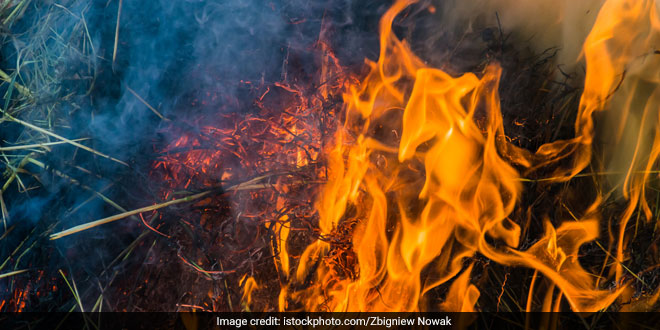New Delhi: There is a decline in the paddy stubble-burning in Punjab this Kharif season, said Punjab Pollution Control Board (PPCB) on Saturday. The data from the PPCB reflects that 7503 cases of stubble-burning have been reported until Friday this year. During the last two years’ corresponding period, there were 13,364 and 19,879 cases of farm burning. The report by the pollution control board shows Amritsar witnessed a slight dip in stubble-burning cases. A little more than 700 incidents have been recorded this year as compared to 785 last year and little lesser than 1000 in 2016.
Also Read: Stubble Burning: Punjab Expects 70 Per Cent Drop In Stubble Fires This Season, Says Official
Fatehgarh Sahib town, the second least populous district of Punjab after Barnala, has shown a sharp decline in the cases of farm residue burning this year- just 226. Last year this figure was 589 and more than 1100 two years ago. The decline can be attributed to various factors, including awareness and farmers adhering to governmental policies in mitigating the farm fires. Patiala, for example, marked quite a drastic improvement with only 936 incidents this season. Over the last two years, the number stood at 1303 and 1718 respectively.
From 1612 in 2016 to just 576 this year, Sri Muktsar Sahib also recorded a steep fall in farm fire cases. The Tarn Taran district, which has the largest Sarovar (holy tank) in the world, also recorded a sharp decline with 1129 cases of crop-burning. In 2017, the region saw 1507 cases and 1980 in 2016. Yet, Delhi’s air quality continues to deteriorate and remains in the very poor category. With Diwali around the corner and the Supreme Court allowing the burning of firecrackers, Delhi might see a layer of toxic smog in the days to come. Environmentalists say people need to be made more aware of the harmful effects of crackers and learn from the farmers of adjoining states- who adhered to administrative guidelines in tackling farm waste.
Also Read: ‘It Takes Just A Matchstick’: Punjab Farmers Take The Cheaper Way Out To Deal With Paddy Stubble
Haryana too recorded a decline in the cases of crop-burning. The state witnessed more than 7500 cases, which is almost half of the last year’s figure of 13,364. Two years ago, the figure touched almost 20,000. Science and Technology Minister Harsh Vardhan has expressed concerns over the increase in air pollution levels in Delhi and its neighbouring cities and assured that Centre will make all efforts to curb the menace.
This time the Central government had appointed 41 teams from the Central Pollution Control Board to do field study of four cities- Faridabad, Ghaziabad, Gurugram and Haryana in order to curb the issue from the grass root level We will make efforts to curb the issue of air pollution, the minister told reporters here.
NDTV – Dettol Banega Swachh India campaign lends support to the Government of India’s Swachh Bharat Mission (SBM). Helmed by Campaign Ambassador Amitabh Bachchan, the campaign aims to spread awareness about hygiene and sanitation, the importance of building toilets and making India open defecation free (ODF) by October 2019, a target set by Prime Minister Narendra Modi, when he launched Swachh Bharat Abhiyan in 2014. Over the years, the campaign has widened its scope to cover issues like air pollution, waste management, plastic ban, manual scavenging and menstrual hygiene. The campaign has also focused extensively on marine pollution, clean Ganga Project and rejuvenation of Yamuna, two of India’s major river bodies.




























